

Plato. Plato (/ˈpleɪtoʊ/; Greek: Πλάτων Plátōn "broad"pronounced [plá.tɔːn] in Classical Attic; 428/427 or 424/423 – 348/347 BCE) was a philosopher, as well as mathematician, in Classical Greece.
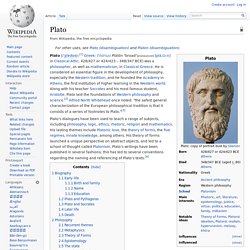
Aristotle. Aristotle's views on physical science profoundly shaped medieval scholarship.
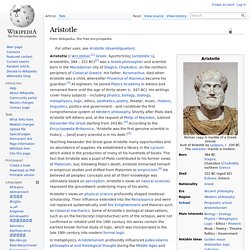
Their influence extended into the Renaissance and were not replaced systematically until the Enlightenment and theories such as classical mechanics. Aristotle on Private Property and Money - Murray N. Rothbard. The views of the great philosopher Aristotle are particularly important because the entire structure of his thought had an enormous and even dominant influence on the economic and social thought of the high and late Middle Ages, which considered itself Aristotelian.
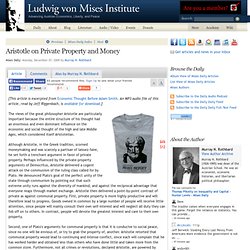
Although Aristotle, in the Greek tradition, scorned moneymaking and was scarcely a partisan of laissez-faire, he set forth a trenchant argument in favor of private property. Perhaps influenced by the private-property arguments of Democritus, Aristotle delivered a cogent attack on the communism of the ruling class called for by Plato.
He denounced Plato's goal of the perfect unity of the state through communism by pointing out that such extreme unity runs against the diversity of mankind, and against the reciprocal advantage that everyone reaps through market exchange. Aristotle then delivered a point-by-point contrast of private as against communal property. Property should be private - Aristotle. Thomas Aquinas. Just price concept - Aquinas. Ibn Khaldun. Ibn Khaldūn (full name, Arabic: أبو زيد عبد الرحمن بن محمد بن خلدون الحضرمي, Abū Zayd ‘Abdu r-Raḥmān bin Muḥammad bin Khaldūn Al-Ḥaḍrami; May 27, 1332 AD/732 AH – March 19, 1406 AD/808 AH) was an Arab Muslim historiographer and historian, regarded to be among the founding fathers of modern historiography,[n 1] sociology[n 1] and economics.[1][n 2] He is best known for his book The Muqaddimah (known as Prolegomena in Greek).
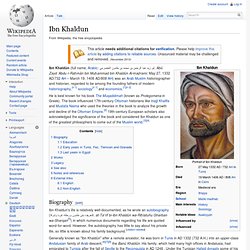
The book influenced 17th-century Ottoman historians like Ḥajjī Khalīfa and Mustafa Naima who used the theories in the book to analyze the growth and decline of the Ottoman Empire.[2] 19th-century European scholars also acknowledged the significance of the book and considered Ibn Khaldun as one of the greatest philosophers to come out of the Muslim world.[3][4] Biography[edit] Generally known as "Ibn Khaldūn" after a remote ancestor, he was born in Tunis in AD 1332 (732 A.H.) into an upper-class Andalusian family of Arab descent,[6][7][8] the Banū Khaldūn.
Medici Bank. The Medici Bank (1397–1494) was a financial institution created by the Medici family in Italy during the 15th century.
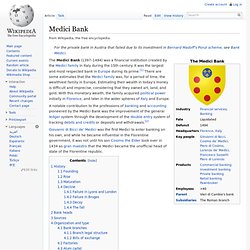
It was the largest and most respected bank in Europe during its prime.[1] There are some estimates that the Medici family was, for a period of time, the wealthiest family in Europe. Estimating their wealth in today's money is difficult and imprecise, considering that they owned art, land, and gold. Negotiable instrument. A 1939 Bill of Exchange, Rangoon, Burma.
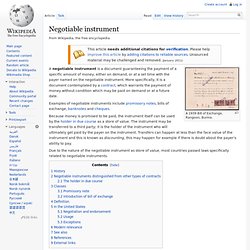
A negotiable instrument is a document guaranteeing the payment of a specific amount of money, either on demand, or at a set time with the payer named on the negotiable instrument. More specifically, it is a document contemplated by a contract, which warrants the payment of money without condition which may be paid on demand or at a future date. Christopher Columbus. Christopher Columbus (Italian: Cristoforo Colombo; Spanish: Cristóbal Colón; Portuguese: Cristóvão Colombo; born between 31 October 1450 and 30 October 1451, died 20 May 1506) was an Italian explorer, navigator, and colonizer, citizen of the Republic of Genoa.
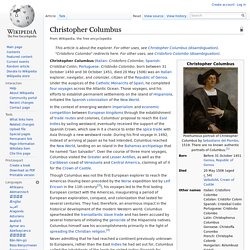
Under the auspices of the Catholic Monarchs of Spain, he completed four voyages across the Atlantic Ocean. Those voyages, and his efforts to establish permanent settlements on the island of Hispaniola, initiated the Spanish colonization of the New World. Though Columbus was not the first European explorer to reach the Americas (having been preceded by the Norse expedition led by Leif Ericson in the 11th century[3]), his voyages led to the first lasting European contact with the Americas, inaugurating a period of European exploration, conquest, and colonization that lasted for several centuries. They had, therefore, an enormous impact in the historical development of the modern Western world. Early life Quest for Asia. East India Company. The company was dissolved in 1874 as a result of the East India Stock Dividend Redemption Act passed one year earlier, as the Government of India Act had by then rendered it vestigial, powerless, and obsolete.
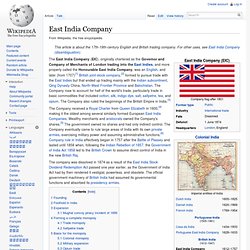
The official government machinery of British India had assumed its governmental functions and absorbed its presidency armies. Founding[edit] In 1596, three more ships sailed east; however, these were all lost at sea.[7] Two years later, on 24 September 1598, another group of merchants having raised £30,133[clarification needed] in capital, met in London to form a corporation. Although their first attempt was not completely successful, they nonetheless sought the Queen's unofficial approval, bought ships for their venture, increased their capital to £68,373[clarification needed], and convened again a year later.[7] Thomas Mun. Thomas Mun (17 June 1571 – 21 July 1641) was an English writer on economics who has been called the last of the early mercantilists.
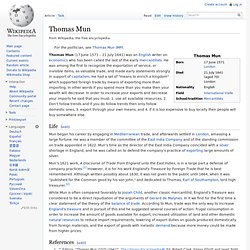
He was among the first to recognize the exportation of service, or invisible items, as valuable trade, and made early statements strongly in support of capitalism. He had a set of "means to enrich a kingdom" which supported foreign trade by means of exporting more than importing. In other words if you spend more than you make then your wealth will decrease. In order to increase your exports and decrease your imports he said that you must: 1. use all available resources, 2. Don't follow trends and if you do follow trends then only follow domestic ones, 3. export through your own means, and 4. if it is too expensive to buy locally then people will buy somewhere else.
Jean-Baptiste Colbert. Colbert's market reforms included the foundation of the Manufacture royale de glaces de miroirs in 1665 to supplant the importation of Venetian glass (forbidden in 1672, as soon as the French glass manufacturing industry was on sound footing) and to encourage the technical expertise of Flemish cloth manufacturing in France.
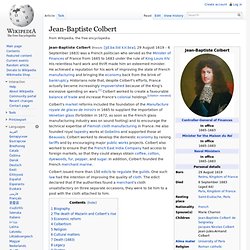
He also founded royal tapestry works at Gobelins and supported those at Beauvais. Colbert worked to develop the domestic economy by raising tariffs and by encouraging major public works projects. John Locke. John Locke FRS (/ˈlɒk/; 29 August 1632 – 28 October 1704), was an English philosopher and physician regarded as one of the most influential of Enlightenment thinkers and known as the "Father of Classical Liberalism".[1][2][3] Considered one of the first of the British empiricists, following the tradition of Sir Francis Bacon, he is equally important to social contract theory.
His work greatly affected the development of epistemology and political philosophy. His writings influenced Voltaire and Rousseau, many Scottish Enlightenment thinkers, as well as the American revolutionaries. His contributions to classical republicanism and liberal theory are reflected in the United States Declaration of Independence.[4] Life and work Locke's father, also called John, was a country lawyer and clerk to the Justices of the Peace in Chew Magna,[6] who had served as a captain of cavalry for the Parliamentarian forces during the early part of the English Civil War. Philipp von Hörnigk. Philipp von Hörnigk (sometimes spelt Hornick or Horneck; 23 January 1640 – 23 October 1714) was an Austrian civil servant and a supporter of the economic theory of mercantilism.
Economic work[edit] Von Hörnigk was born in Frankfurt am Main and died in Passau. He wrote in a time when his country was constantly threatened by Turkish invasion. Dudley North (economist) Sir Dudley North (1641-1691) Sir Dudley North (16 May 1641, in Westminster – 31 December 1691, in London) was an English merchant, politician and economist, a writer on free trade. He engaged in foreign trade, especially with Turkey, and spent a number of years at Constantinople and Smyrna. Having returned to London with a fortune, he continued to trade with the Levant. His knowledge of commerce attracted the attention of the government, and he was further recommended by the influence of his brother Lord Guilford.
During the Tory reaction under Charles II he was one of the sheriffs forced on the city of London in 1683 with an express view to securing verdicts for the crown in state trials. He was buried at St Paul's church, Covent Garden. John Locke. Josiah Child. Sir Josiah Child, 1st Baronet (1630 – 22 June 1699) was an English merchant and politician. He was an economist proponent of mercantilism and governor of the East India Company. Early life[edit] Purchase of Wanstead Manor[edit] Wanstead House, residence of Sir Josiah Child from 1673, as it appeared until 1715 "I went to see Sir Josiah Child's prodigious cost in planting of walnut trees about his seat and making fishponds many miles in circuit in Epping Forest in a barren spot as commonly these overgrown and suddenly monied men for the most part seat themselves.
According to Daniel Defoe Child "added innumerable rows of trees, avenues and vistas to the house, all leading up to the place where the old house stood, as to a centre".[7] William Petty. Sir William Petty FRS (26 May 1623 – 16 December 1687) was an English economist, scientist and philosopher. He first became prominent serving Oliver Cromwell and Commonwealth in Ireland. He developed efficient methods to survey the land that was to be confiscated and given to Cromwell's soldiers.
He also managed to remain prominent under King Charles II and King James II, as did many others who had served Cromwell. Quantulumcunque Concerning Money. Quantulumcunque concerning Money by William Petty 1682 To the Lord Marquess of Halyfax Suppose that 20s of new mill'd Money doth weigh 4 Ounces Troy, according to Custom or Statute. John Locke. François Quesnay. Gregory King. David Hume. Jacques Claude Marie Vincent de Gournay.
Jacques Claude Marie Vincent de Gournay (French: [də ɡuʁnɛ]; 28 May 1712, Saint-Malo – 27 June 1759, Cádiz) was a French economist and intendant of commerce. Adam Smith. 18th-century Scottish moral philosopher and political economist. Anne-Robert-Jacques Turgot, Baron de Laune. Jeremy Bentham. Jeremy Bentham (/ˈbɛnθəm/; 15 February [O.S. 4 February] 1748 – 6 June 1832) was a British philosopher, jurist, and social reformer. David Hume. François Quesnay. Tableau économique. Public good.
A fireworks display is a public good because it is non-excludable (impossible to prevent people from using it) and non-rivalrous (one individual's use does not reduce availability to others).[1] Public goods include fresh air, knowledge, public infrastructure[dubious ], national security, education[dubious ], common language(s), widespread and high public literacy levels, flood control systems, lighthouses, and street lighting. Public goods that are available everywhere are sometimes referred to as global public goods.[1] There is an important conceptual difference between the sense of 'a' public good, or public 'goods' in economics, and the more generalized idea of 'the public good' (or common good, or public interest),[3][4]"‘the’ public good is a shorthand signal for shared benefit at a societal level [this] (philosophical/political) sense should not be reduced to the established specific (economic) sense of ‘a’ public good.
Greatest happiness for greatest number - Bentham. Tax only land, free trade – Turgot. Adam Smith, the father of modern political economy. Circular flow of income. Trade balance is impossible - Hume. Gregory King statistical summary of the trade of England. History of national accounts. Agricultural surplus is wealth – Quesnay. Free trade. British Enlightenment.
Trade regulation is wrong – North. Self sufficiency and national power – Hornigk. Tulip mania. New definition for property – Locke. Abundance of money makes difference - Colbert. Frugal consumption is important – Mun. Brand. History of Economics. Mercantilism. The Medieval Bill of Exchange. Social cohesion is the key - Khaldun. Just price. Benefit from trade is a must - Scotus. On statecraft and economic policy - Chanakya. Ancient economic thought. The Economics Book: DK Publishing: 9780756698270: Amazon.com. History of economic thought.